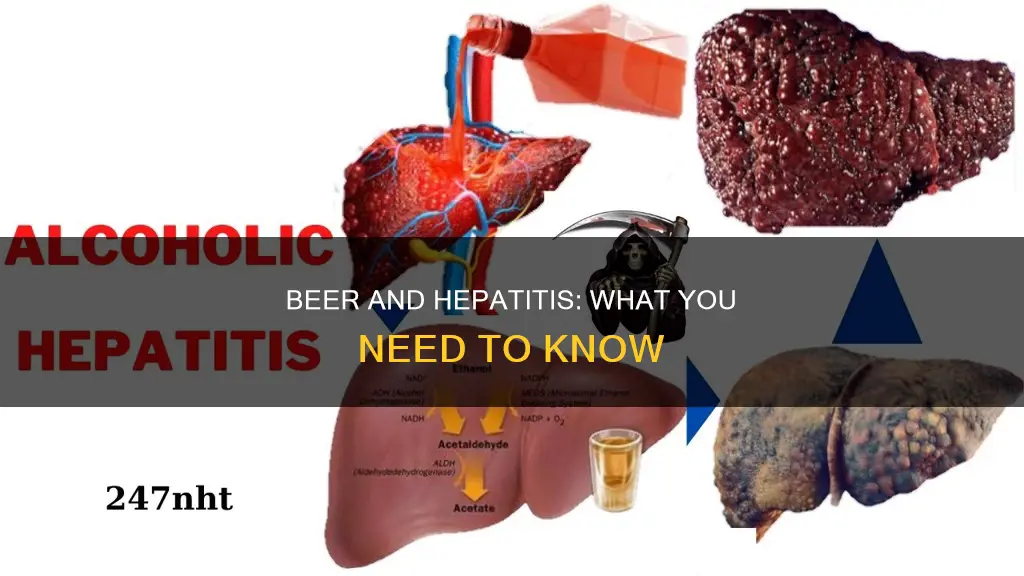
Alcoholic hepatitis is a type of alcoholic liver disease that occurs when a person consumes more alcohol than the liver can process. The liver is the body's second-largest organ and is responsible for converting food and drinks into nutrients, as well as filtering poisons and harmful substances, including alcohol, from the blood. While the liver can process alcohol in small doses, excessive alcohol consumption can lead to inflammation of the liver, known as alcoholic hepatitis, which can cause swelling and scarring of the liver.
The condition can range from mild to severe, and in severe cases, a person may require a liver transplant if they do not stop consuming alcohol or receive treatment during the early stages. Abstaining from alcohol is highly recommended to protect the liver, especially for individuals with hepatitis B or C infection, as alcohol can promote viral replication, increase oxidative stress, suppress the immune response, and lead to more severe liver damage.
It is important to note that alcoholic hepatitis can still occur in moderate drinkers, although the risk is lower. Therefore, it is advisable to drink alcohol in moderation and be aware of the early signs of excessive alcohol consumption to prevent severe health complications.
| Characteristics | Values |
|---|---|
| Alcohol-induced hepatitis | Inflammation of the liver caused by alcohol use |
| Hepatitis B virus infection | Alcohol abuse is a risk factor for the development of end-stage liver disease |
| Hepatitis C virus infection | Alcohol abuse is a risk factor for the development of end-stage liver disease |
What You'll Learn

Alcohol and hepatitis B: a complex relationship
Alcohol-induced hepatitis is inflammation of the liver caused by alcohol use. The liver is the main target organ for hepatitis viruses and the vital organ for alcohol metabolism. The interaction of alcohol with viral hepatitis is complex and not fully understood. The effects of alcohol on viral hepatitis include promoted viral replication, weakened immune response, and increased oxidative stress. Clinically, alcohol abuse is correlated with an increased risk of developing end-stage liver cirrhosis and hepatocellular carcinoma in patients with chronic hepatitis B and C.
Beer before work: Is it illegal or not?
You may want to see also

Alcohol and hepatitis C: a clear negative impact
Hepatitis C is a bloodborne infectious disease that affects the liver and can lead to serious illness, with around 4 million people in the US infected. Alcohol consumption is known to increase the likelihood of cirrhosis among Hepatitis C patients, with 10-15% of chronically infected patients developing cirrhosis within 20 years of infection.
Alcohol's Impact on Hepatitis C
Alcohol has a clear negative impact on individuals with Hepatitis C. Alcohol is a toxin that, when processed by the liver, breaks down into poisonous chemicals. Chronic heavy alcohol use overloads the liver with fat and toxins, and when the liver can no longer keep up, these toxins and fat build up and begin to damage the liver. This damage triggers an inflammatory response, which, if constant, can lead to cell death and permanent liver damage.
Alcohol and Hepatitis C: A Dangerous Combination
The combination of alcohol and Hepatitis C can have severe consequences. Alcohol increases the damage done to the liver and speeds up the development of cirrhosis. For example, after 25 years of Hepatitis C infection, heavy drinkers show more than twice the scarring of light drinkers or non-drinkers. After 40 years, most heavy drinkers have developed cirrhosis.
Alcohol's Impact on Hepatitis C Treatment
Heavy drinking during Hepatitis C antiviral (interferon) treatment has been shown to impede patients' responses to therapy. Abstaining from drinking before and during treatment improves patients' response, although this improvement is not total. Therefore, alcoholic patients should be advised to abstain from alcohol and be alcohol-free for at least six months before beginning interferon therapy.
Excessive alcohol consumption among patients infected with Hepatitis C is likely to result in more severe liver injury, promoting cirrhosis and increasing the risk of liver cancer. Abstaining from alcohol can improve patients' prognosis and slow down the progression of the disease.
Beer Breakdown: Understanding Its Effect on the Human Body
You may want to see also

Alcohol and hepatitis: a barrier to treatment
Alcoholic hepatitis is a severe form of alcoholic liver disease, characterised by the rapid onset of jaundice, malaise, tender hepatomegaly, and subtle features of systemic inflammatory response. It is caused by frequent high alcohol consumption, which overloads the liver with toxins and fat that it cannot process, resulting in inflammation and cell death. The liver is the body's main organ for alcohol metabolism, and so the two factors in combination – viral hepatitis and alcohol abuse – can exert dual harmful actions, leading to enhanced damage to the liver.
The effects of alcohol on viral hepatitis include promoted viral replication, a weakened immune response, and increased oxidative stress. Alcohol abuse is correlated with an increased risk of developing end-stage liver cirrhosis and hepatocellular carcinoma in patients with chronic hepatitis B and C, suggesting that the combination of alcohol and HBV/HCV leads to more severe liver damage.
There is no medicine to treat alcohol-induced hepatitis directly, and the only effective treatment is to quit drinking. However, this must be done under medical supervision, as quitting cold turkey can lead to withdrawal symptoms and dangerous side effects. Nutritional therapy is often required, as alcohol use and liver damage can cause malnutrition. In severe cases of alcohol-induced hepatitis, short-term steroids may be administered to help reduce inflammation and encourage liver cells to regenerate.
Abstinence from alcohol is highly recommended to protect the liver, especially in individuals with HBV/HCV infection, to improve the clinical efficacy of antiviral treatment and prevent the rapid progression of chronic viral hepatitis.
Tailgating and Beer: What You Need to Know
You may want to see also

Alcohol and hepatitis: a complex interplay of factors
Alcohol-induced hepatitis is inflammation of the liver caused by alcohol use. The liver is the main target organ for hepatitis viruses and the vital organ for alcohol metabolism. The combination of alcohol abuse and viral hepatitis can lead to enhanced liver damage. Alcohol can increase viral replication, weaken the immune response, and increase oxidative stress.
The mechanisms by which alcohol enhances disease progression are less well understood in chronic hepatitis B than in chronic hepatitis C. The association of light-to-moderate alcohol consumption with clinical outcomes in patients with chronic hepatitis B virus (HBV) infection appears modest. Although the threshold amount of alcohol for increasing hepatocellular carcinoma (HCC) risk remains unknown, heavy alcohol consumption significantly accelerates the progression of liver disease to cirrhosis and, ultimately, HCC. Alcohol abuse could impair the response to interferon-α therapy in chronic hepatitis B patients, although not fully confirmed, and can increase the risk of HCC even in patients with low HBV DNA levels during nucleoside/nucleotide therapy.
Beer and Aimovig: What You Need to Know
You may want to see also

Alcohol and hepatitis: a need for further research
Alcohol-induced hepatitis is inflammation of the liver caused by alcohol use. The liver is the main target organ for hepatitis viruses and is also the vital organ for alcohol metabolism. The combination of viral hepatitis and alcohol abuse can lead to enhanced liver damage.
The interaction of alcohol with viral hepatitis and the underlying mechanisms are not fully understood. However, studies have shown that alcohol can increase viral replication, oxidative stress, and cytotoxicity but decrease antiviral immune responses in the liver.
There is a need for further research on the effects of alcohol intake on the progression of hepatitis-associated liver disease. The influence of mild to moderate alcohol drinking on hepatitis-induced liver fibrosis, cirrhosis, and hepatocellular carcinoma among patients infected with hepatitis remains unclear.
Additionally, the effects of alcohol on the clinical efficacy of antiviral treatment for hepatitis infection require further investigation. While interferon-based therapy is less effective in alcohol drinkers, direct-acting antivirals have been highly effective for the treatment of hepatitis infection, and alcohol intake does not seem to alter the achievement of sustained virologic suppression.
In conclusion, while alcohol is known to adversely affect hepatitis infections, further research is needed to fully understand the underlying mechanisms and the effects of alcohol on the progression and treatment of hepatitis-associated liver disease.
Drinking Beer in Public: Texas Law Explained
You may want to see also
Frequently asked questions
Alcohol is not recommended for people with hepatitis. Alcohol is a toxin that can overload the liver and cause further damage.
Alcohol can increase the risk of developing cirrhosis and even deadly liver cancer.
There is no safe level of alcohol consumption for people with hepatitis.







